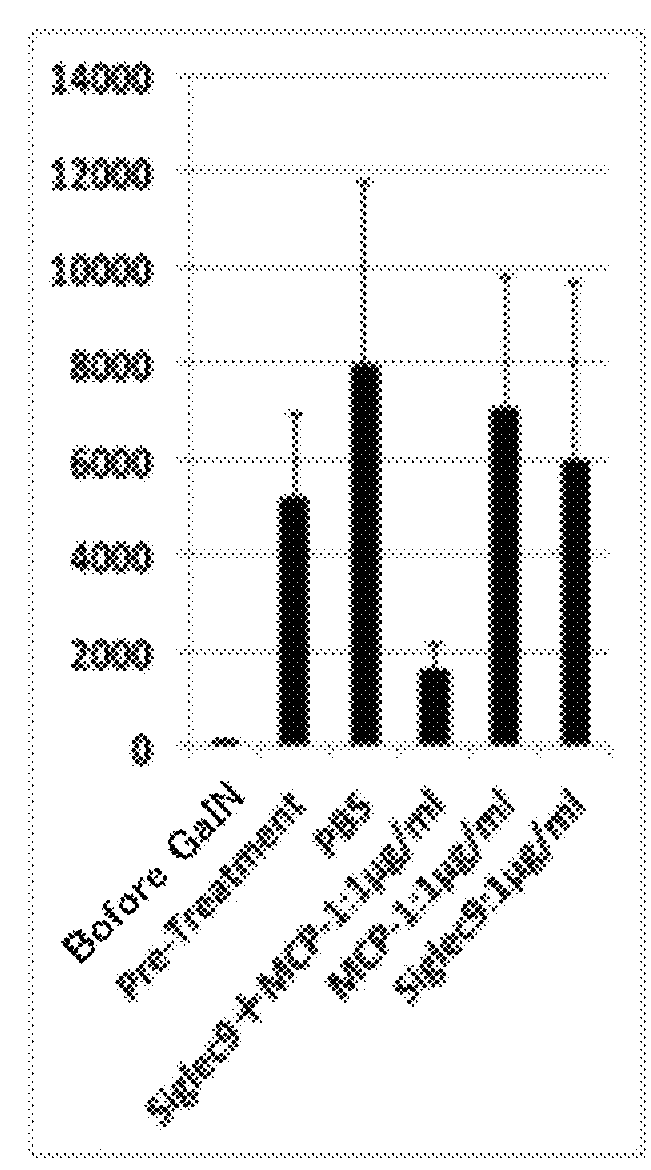Composition having tissue-repairing activity, and use therefor
a technology of tissue repair and activity, applied in the field of compositions with tissue repair activity in inflammatory disorders, can solve the problems of increased pain and injury to the body's own tissue, and achieve the effect of increasing anti-inflammatory cytokines and promoting the occurrence of tissue-repairing microglia
- Summary
- Abstract
- Description
- Claims
- Application Information
AI Technical Summary
Benefits of technology
Problems solved by technology
Method used
Image
Examples
example 1
[0175](Analysis of Therapeutic Usefulness of Dental Pulp Stem Cells Using Severe Hepatitis Model)
[0176](1) Preparation of Severe Hepatitis Model Rats
[0177]A D-galactosamine solution for inducing severe liver damage was prepared by dissolving it in PBS / NaOH solution. This solution was administered intraperitoneally to Sprague-Dawley rats (200 to 250 g) to 1.2 g of D-galactosamine per kg of rat weight). 24 hours after administration blood was taken, and AST and ALT were measured to confirm induction of severe liver damage (severe hepatitis).
[0178](2) Drug Preparation
[0179]A 1 μg / ml pBS solution of ED-Siglec-9 (recombinant human Siglec-9 Fc chimera, R & D Systems, chimera protein containing Gln18 to Gly348 of human Siglec-9) alone, a 1 μg / ml PBS solution of MCP-1 recombinant protein (recombinant human MCP-1 / CCL2 (Peprotech)) alone and a PBS solution containing 1 μg / ml each of ED-Siglec-9 and MCP-1 recombinant protein were prepared.
[0180](3) Administration
[0181]1 ml of each of the three...
example 2
[0193]In this example, the effects of MCP-1, ED-Siglec-9 and CSPG were confirmed using mouse microglia and rats with spinal cord injury. The experimental methods are given below, followed by the results.
[0194](1) Isolation and Cell Culture of Mouse Microglia
[0195]Primary neurons were isolated from newborn C57BL / 6 mice. After 14 days of culture, the microglia were isolated from the cell mixture by the “shaking off” method. The purity of the cultured cells as determined by immune staining of the Fc receptors was 97 to 100%. The culture was maintained in DMEM with 10% fetal bovine serum, 5 μg / ml bovine insulin and 0.2% glucose added thereto.
[0196](2) Microglia CSPG Activation Assay
[0197]A 48-well tissue culture plate was coated with 1 μg / ml of poly-L-lysine (PLL; Sigma) or 100 ng / ml of extracellular chondroitin sulfate proteoglycan (CSPG; Millipore). The microglia were seeded 2.0×105 cells / well in serum-free DMEM on the PLL or PLL / CSPG. The serum-free DMEM contained recombinant human M...
example 3
[0227](Application to Acute Lung Damage (Interstitial Pneumonia))
[0228]In this example, it was discovered that inflammation and fibrosis accompanying acute lung damage were suppressed by administration of MCP-1 and ED-Siglec-9.
[0229](Acute Lung Damage Model Mouse)
[0230]Bleomycin (BLM), which causes damage to alveolar epithelial cells, was dissolved 3 mg / ml in PBS to prepare a PBS solution of BLM. This solution was administered intratracheally at a level of 6 U / kg to 7 to 9 week old C57B1 / 6J mice, and after 24 hours the presence of lung damage was confirmed by listening to Velcro rale.
[0231]24 hours after lung damage, a PBS solution containing 1 μg / ml each of MCP-1 and ED-Siglec-9 recombinant protein was administered intravenously to the jugular veins of model mice, and the subsequent pathology was observed. FIG. 12 shows survival rates and weight changes in the MCP-1 / ED-Siglec-9 administration group and non-administration (PBS administration) group.
[0232](Evaluation of 9-day Weight ...
PUM
| Property | Measurement | Unit |
|---|---|---|
| temperature | aaaaa | aaaaa |
| temperature | aaaaa | aaaaa |
| temperature | aaaaa | aaaaa |
Abstract
Description
Claims
Application Information
 Login to View More
Login to View More - R&D
- Intellectual Property
- Life Sciences
- Materials
- Tech Scout
- Unparalleled Data Quality
- Higher Quality Content
- 60% Fewer Hallucinations
Browse by: Latest US Patents, China's latest patents, Technical Efficacy Thesaurus, Application Domain, Technology Topic, Popular Technical Reports.
© 2025 PatSnap. All rights reserved.Legal|Privacy policy|Modern Slavery Act Transparency Statement|Sitemap|About US| Contact US: help@patsnap.com



